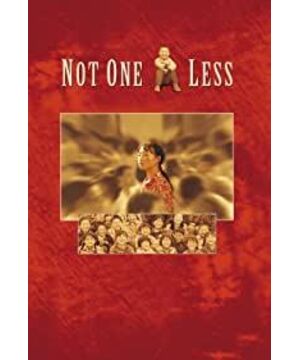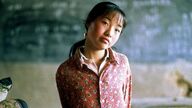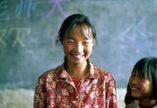A rare and touching humanistic work, Zhang Yimou, who got up early, is still worthy of respect. The first time I saw this movie was when it was released in the third grade of elementary school. That old-fashioned movie projector, kind of like the old-fashioned one in Cinema Paradiso, crowded the dilapidated classroom. A white curtain rose in front of the podium, and a beam of light beams full of texture hit the curtain, which aroused my curiosity. But at that time, I was not moved by the movie itself. After all, the world of childhood was always attracted by elements such as martial arts, fantasy, and zombies.
Besides, the stories and scenes in the movie are not much different from our lives at that time. Tattered tables and chairs, a pitted playground, full of patches or ill-fitting clothes. But there will also be that carefree joy and contentment, and even sadness will be filled with a touch of sweetness. The green fields are full of violets. In the clear river in summer, there will be three or five people playing in the water. There is also a brick factory, which has become a game paradise for friends. Everything is so beautiful, yet so easy to fade away.
This movie may have a deep connection with me, and I always remember one of the scenes at the time. It was the part of the chase where the car was not caught, but fell down. The stubborn but helpless situation was deeply rooted in the hearts of the people. This film, in the style of a documentary, confronts the educational problems of rural backwardness in China.
There is no wonderful storyline, no magnificent composition and gorgeous pictures. Only life itself. With a strong humanistic documentary style, he won the Golden Bear Award in one fell swoop. But I have to say that this movie reminds me of the late Iranian master, Abbas. His films are also full of documentary and humanistic colors, non-professional actors, and focus on backward and remote groups, especially children. Light and shadow are full of philosophical thinking and care, small and great. It makes people unable to distinguish between light and shadow and the real world, or beyond the life itself at all.
Zhang Yimou is obviously like Abbas in learning from scriptures, posing fixedly, focusing on children's education and life in backward areas, and at the same time, he also has a clear Abbasid style about the contrast between adults and children. Although it is not as profound and plain as Abbas, it is also not out of the norm. It firmly sticks to the unique theme of China's backward rural education, and captures the inner emotional appeal of children, which is very touching.
Different from the past, this time he chose to narrate the heavy social themes in a plain and light way, and also created a happy ending. Even if the film is full of elements such as backwardness, rural areas, poverty, left-behind children, school dropout children, illegal child labor, and urban-rural disparity, we can still see the traditional spirit of the Chinese nation that is persevering and persevering.
However, Zhang Yimou, who has entered the new year, has already changed in quality. In fact, I can't blame him, after all, no one's inspiration is limited. In particular, it does not have a deep cultural background, and at the same time, it has jumped out of the class that was the source of inspiration for life, and will soon wither. The best Zhang Yimou can't come back.
May there be more people like Abbas in China!
View more about Not One Less reviews








